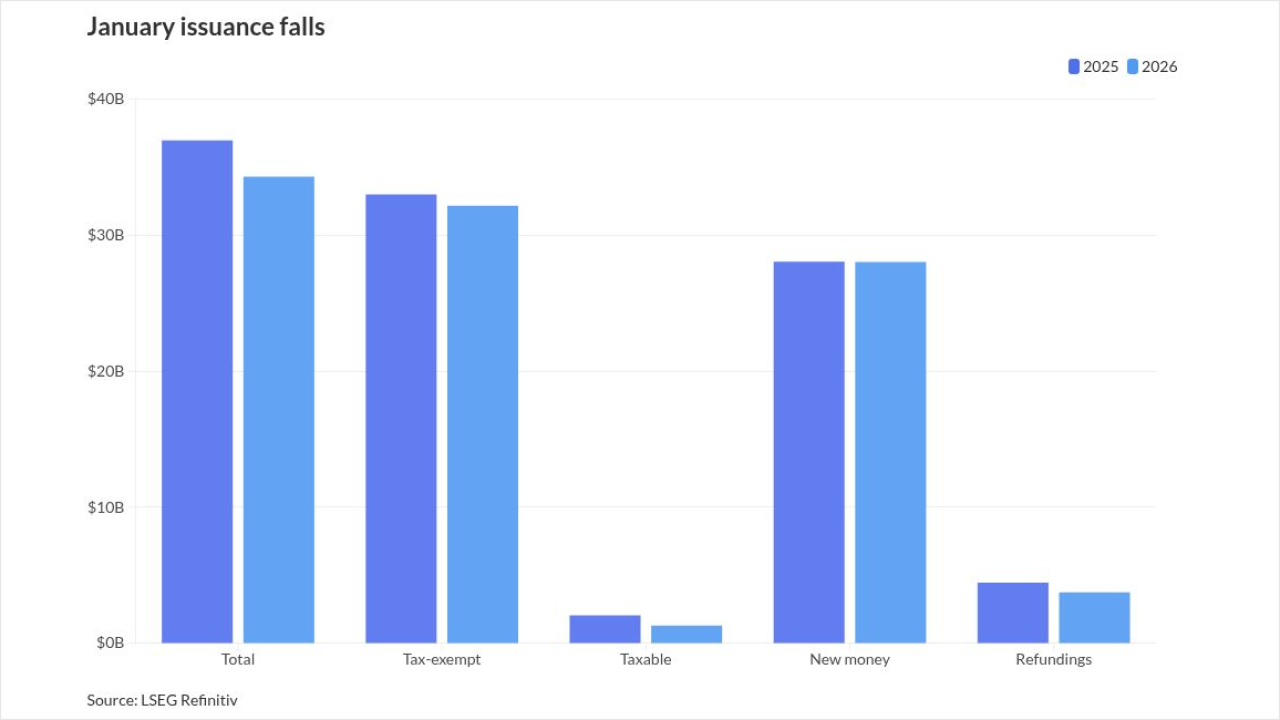The new Republican governors in Florida and Georgia have proposed their first budgets, with each taking a cue from their predecessors on infrastructure financing.
Both governors recommended record spending plans for fiscal 2020 that they said are based on conservative principles.

The governors are likely to find success in funding their priorities since the GOP holds a trifecta of top offices, the governor and a majority in both legislative chambers, in each gilt-edged state.
Their bond proposals focus on different areas.
In Florida, Gov. Ron DeSantis’ proposed capital borrowing plan would fund only transportation projects. That continues a policy implemented by fellow Republican Rick Scott, who opposed issuing most new debt during his eight years in the governor’s office.
Ben Watkins, director of Florida’s Division of Bond Finance since 1995, said there was little time between the November election and the state deadline to propose a budget, so DeSantis’ proposal on the use of bonds may be a continuation “of the course we had been under Gov. Scott.”
During his first month in office, DeSantis has widely discussed his budget and funding priorities, which include an emphasis on the environment, clean water initiatives, and funding teacher’s salaries and bonuses, said Watkins.
“I don’t think it fully reflects what his [bond financing] initiatives will be,” Watkins’ said of the proposed budget. “It’s just too soon to tell.”
Calling it a “Bold Vision for a Brighter Future,” DeSantis’ budget totals $91.3 billion, and represents a 2.14% increase over the current spending plan. He proposed authorizing $792.8 million of bonds for road and bridge projects. Most of these bonds are secured by a pledge of state gas taxes, as well as Florida's full faith and credit.
“My $91.3 billion budget proposal is aspirational yet attainable and recommends $335 million in tax cuts for Floridians,” said DeSantis, who spent three terms in Congress before being elected in November. “How we spend reflects how we serve and the people of Florida should be served by leaders who spend with fiscal restraint while addressing the pressing issues facing our state.”
In his budget, Georgia Gov. Brian Kemp recommended continuing the state’s long annual tradition of issuing general obligation bonds for a wide variety of capital projects across the state. Calling his budget a strategy for “Putting Georgians First,” Kemp unveiled his plan Jan. 16, calling for $53.2 million in spending, a 5.17% increase over the original budget adopted for this year.
Kemp is recommending the issuance of $1.05 billion of state general obligation bonds to finance capital projects such as public schools, universities, state buildings and equipment, and $150 million to replace voting systems statewide.
Neither governor responded to requests for comment on how they developed policies about the use of bonds to fund infrastructure projects.
Florida and Georgia are the top two states for municipal bond issuance in the Southeast.
Chris Meir, a managing director for Loop Capital Markets, said Florida and Georgia take slightly different approaches to financing infrastructure and transportation.
“I think that both are acting conservatively and within what might generally be considered ‘GOP-consistent’ debt policies,” Meir said in an email to The Bond Buyer, “Having said that, the priorities may well be different in the two states and may call for different allocations of debt.”
Loop’s Municipal Bond Volume Forecast for 2019 said “fiscally conservative attitudes held sway in many state and local governments despite years of underinvestment in deteriorating infrastructure.”
GOP control of both the state legislature and governorships “created the most restrictive environment for muni issuance in recent years as state and local government officials were averse to debt, concerned about rising debt service and pension burdens on general fund budgets,” Loop said.
Some of those issues applied to Scott when he was Florida’s governor from 2011 until Jan. 7. Scott, termed out of the governor's office, won a seat in the U.S. Senate in November.
During Scott’s tenure, Florida’s total direct debt declined by approximately $7.1 billion, or 25%, because little new money debt was authorized under Scott’s policies.
“The decrease in new money debt authorizations was due in part to a change in debt management policy that requires more rigorous scrutiny of debt financed projects with a focus on the return on investment or other appropriate quantitative metrics,” according to Florida’s debt affordability report, which was issued in December.
Scott said he recommended using bond financing on transportation projects that he believed would offer a return on investment of more than 4 to 1.
Early in his administration, Scott also excluded issuing debt for public school capital needs and environmental projects, even though the state had long-established bond programs for them.
In fiscal 2019, Scott recommended issuing $739 million of bonds and in fiscal 2018 he proposed $369.5 million, with all proceeds going to projects managed by the Florida Department of Transportation.
In his last year in 2019, Georgia Gov. Nathan Deal sought $875.3 million of bonds and in fiscal 2018 he proposed $1.05 billion, all financing a wide range of capital programs.

Both new governors were backed by President Trump and won narrow elections against Democrats.
At 40, DeSantis is the youngest serving governor. Kemp is 55.
Both men have announced budgets that further GOP priorities, such as cutting business regulations. The two have also placed an emphasis on teacher pay and funding environmental and water quality programs.
The Florida Legislature has begun digesting DeSantis’ budget in pre-session meetings. He’s recommended placing $3 billion in reserves, though the state has access to an additional $2.2 billion in revenues in other accounts.
DeSantis will give his State of the State address on March 5, when the annual 60-day session begins.
The Georgia Legislature’s session began Jan. 14, and is expected to run through early April.
“With conservative budgeting, Georgia has maintained a triple-A bond rating,” Kemp said in his State of the State address three days after the session started. “Our rainy day fund stands at $2.5 billion. Our fiscal house is in order.”





